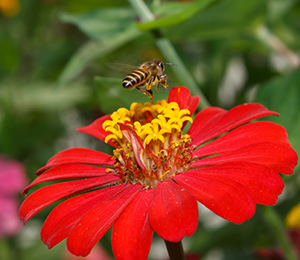The Buzz on Bees

Bees are vital to our food supply and do a lot more than make honey. To learn more, here is a Q & A with Kentucky State Apiarist Dr. Tammy Horn Potter.
Q: What do people need to know about bees? Why are they important to us?
Bees are an integral part of our food chain. People often do not realize that the fruits and vegetables that they cherish for their tables, nutrition and seasonal decorations must have “seed set” provided by pollinators. If a plant flowers, the chances are high that it needs to be pollinated.
Many of our cultural traditions revolve around flowers and/ or vegetables, yet many people are unaware of the relationship between flowers and pollinators. A good example is pumpkins, which require pollination. Since Kentucky has such a rich agrarian heritage, many of our cities decorate downtowns and buildings with pumpkins in October, completely oblivious to the bees needed to provide the seed set in July and August. No bees. No pumpkins. The same goes for many other foods and plants.
Q: What role do bees play in agriculture?
They are our cargo carriers. Flowers are rooted to the ground, so they cannot reproduce without
the aid of pollinators. In an effort to attract them, flowers provide a sugary substance called nectar
and a wide display of colors, petal structure and scents which lure bees, hummingbirds or other
pollinators. The pollinators, in turn, will inevitably gather the flower’s pollen as they collect the
nectar. As the bee leaves the flower and goes to another flower, it leaves pollen in the new flower.
Thus, a new vegetable or a new generation of flower can develop.
Q: Why are bees disappearing?
Bees are threatened by land use pressures, a shallow genetic gene pool for queen bees, parasites
that carry viruses, pests and predators. The varroa mite, which is a relatively new transplant from
Asia, lives off the bodies of honey bees. These mites inflict physical damage to the honeybees while
also transferring many viruses. Some of the apiaries in Kentucky have had as many as five different
viruses. Then there are the usual reasons for hive decline. For instance, bears have become a major
problem in eastern and southern Kentucky. Floods wiped away some hives from last year.
Unfortunately, thefts have been on the rise in our state. And, lastly, a lot of people are scared of
bees and even more people have no clue about where their food comes from.
Q: What can cities, and even individuals, do to help the bee population?
A great thing anyone can do is plant and maintain more pollinator-attractive flowers in urban and
suburban yards.
Another tip is to delay using insecticides and herbicides until after 4 p.m. This allows the foragers to
return home and the chemicals to dry on the plants during the evening hours.
Individuals can do their part to discourage mosquito breeding areas, which can then decrease the
need for spraying, which can be harmful to bees. Where there’s available green-space, provide
habitat for other types of native bees, such as mason bee hives. Mason bees are stingless, but very
good pollinators.
Finally, communicate. Maintain lines of communication between highway weed control and bee
association leaders.
Q: Can people safely keep bees in the city?
Yes, but it requires a lot of communication between the beekeeper and neighbors, and in some
cases, landscape design smart uses of to make the honeybees fly up and over people’s walkways.
Rooftop beekeeping has taken hold in Louisville and Lexington. Potted trees placed in front of
beehives can force bees up and over people’s heads. Garbage cans can serve in the same way.
I advise beekeepers to allow at least 500 feet from the hive to a neighbor’s fence line, and for that
fence to be solid if a neighbor is apprehensive about the bees. Also, make sure your neighbors
know the difference between honeybees and yellow jackets, which live underground. Most people
do not know the difference and have had horrible experiences with yellow jackets. Honeybees are
attracted to salts in swimming pools, so I recommend that beekeepers keep a baby pool close by so
that the honeybees obtain their water from that source. There are safe bee repellent products
available, such as Fischer’s Bee Quick.
Q: Are there unique challenges — or advantages — for bees in Kentucky?
Our state has close to 54 locally based bee associations. Beekeepers in Kentucky tend to stay at the
hobbyist level, when our state natural resources could easily support side-liner and commercial
entities. There are real opportunities for this type of business. The Kentucky Department of
Agriculture supports beekeepers by providing opportunities for the Kentucky State Beekeepers
Association (KSBA) to participate in the Kentucky State Fair. This is a great place to learn more about
beekeeping. The Kentucky Queen Bee Breeders Association (KQBBA) serves beekeepers who want
to become queen bee producers.
Q: How does the Department of Agriculture support efforts around bees?
Some state departments of agriculture have eliminated the position of apiarist, but the Kentucky
Department of Agriculture has maintained my position. We also produce a monthly newsletter,
BeeLines, which is a great source of information about beekeeping events located around the state.
Q: How many beekeepers are in Kentucky?
There are approximately 2,500 beekeepers in Kentucky, and most are hobbyists. I encourage
support of local beekeepers by buying [local] honey and replacing refined sugars with honey. You
can also ask local beekeepers to speak at events and meetings. The more information we get out to
people, the better for the bees!
About Dr. Tammy Horn Potter
Dr. Horn Potter has been involved in beekeeping for more than 20 years In 2014, Horn Potter became the Kentucky State Apiarist. Her work includes hive health, economic development and education about bees. Horn Potter can be reached at the Kentucky Department of Agriculture or 502.573.0282.


